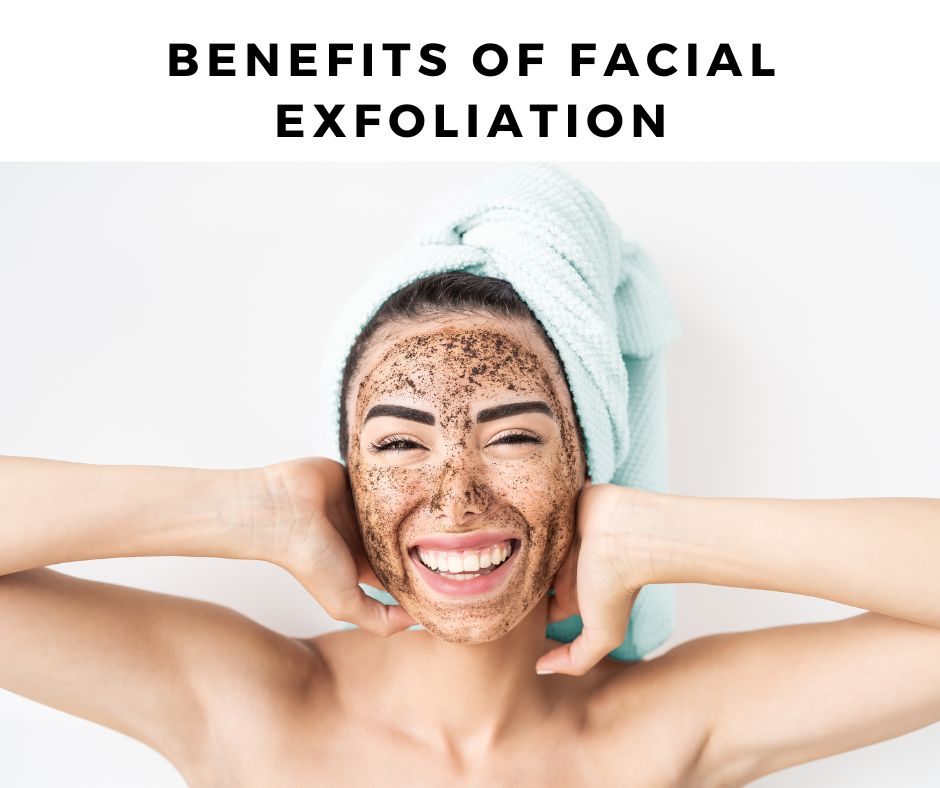Facial Exfoliation has always been my favorite skincare tip. I love the benefits of facial exfoliation whether using a physical exfoliator (a grainy-textured substance I massage into my skin to remove surface debris manually) or a chemical exfoliator (a combination of safe-for-skin acids that chemically dissolve debris), I always bask in the moment. There is something about it that feels refreshing and freeing-almost like I’m setting my complexion back to its natural, fresh state.

Everyone says facial exfoliation is a crucial step in a well-rounded skincare routine since it sloughs off dead and dry skin. But how about if you have dry skin? Expert reveals that aside from clearing away dry and dead skin, a regular exfoliation habit increases your skin’s radiance, clarity, and youthfulness, and that’s just the start.
Table of Contents
5 Benefits of Facial Exfoliation:
Cleans and purifies clogged pores
First, when exfoliating your skin, you effectively unclog your pores—sweeping away that dead and dry skin along with all the other surface debris that might remain on your skin after cleansing stops it from making its way into your pores and causing stubborn stoppages in the form of whiteheads and blackheads. These two skin issues are difficult to eliminate, which is why exfoliating is so important. It stops them before they even have a chance to appear.
Dead skin seals the pores, so when sebaceous glands produce oil, it’s stuck under the skin. It causes breakouts because there is nowhere for the oil to go.
Sloughs away dead skin and encourages new, fresh cell turnover
Unclogging pores prevents not only white and blackheads but also prevents other blemishes. Exfoliating helps to unclog pores, therefore reducing acne.
If you use a physical exfoliant that contains beads or small grains, do it once or twice a week. A gentle chemical exfoliant may be used daily, depending on its strength. If you are ever sensitive or your face is red after exfoliating, reduce your frequency.
Exfoliation can also help to boost your skin’s overall radiance. It helps cell turnover, so the skin looks glowing. The skin keeps fresh, healthy cells at the surface, removing dead, dry, or dying ones.
It helps skincare products penetrate deeper
Having your pores unclogged and free of dead skin allows your skincare products to penetrate more deeply and effectively. Exfoliation helps serums, moisturizers, and growth factors penetrate deeper into the skin. When something rich in nourishing ingredients penetrates more profoundly, it can work effectively, which is why exfoliation should always be included in your skincare routine. Dead skin becomes a barrier between your skin and serums. By removing it, you allow everything to work much better.
Boosts circulation
Exfoliation has many benefits, including stimulating lymphatic drainage for internal cleansing and stimulating oxygen-rich blood to feed and nourish the skin’s surface. The stimulation of lymphatic drainage of internal cleansing is a form of skin detoxification working to remove toxins and other unhealthy debris. At the same time, the inspiration of oxygen-rich blood boosts cellular health to reveal glowy, radiant skin (that is why oxygen facials are so pervasive around the globe).
Even skin tone
People with dark spots, rough texture, hyperpigmentation, and acne scars know how frustrating these issues can be to treat. Exfoliants help break down dead skin while at the same time smoothing its overall texture, making the skin appear more uniform over time.
Among the five benefits of exfoliating, this is my favorite.
Regarding how often you should be exfoliating, listen to your skin. Some people prefer physical ones over chemical exfoliants and vice versa. Normal skin can handle a gentle exfoliant three to seven times a week. If you use a chemical exfoliant, once to thrice a week would be better. But for the physical exfoliant like a scrub, aim for three to four times a week. Look for a tiny milled grain such as flax seeds and rice; they should not scratch and damage your skin.

